Hors d’oeuvre of affliction
April 27, 2005
Some years ago a friend of mine waxing rabbinic told me that during Pesach week, whilst eating charoset one must never say, ‘Mmmmm, I love charoset!”, because charoset, a delicious mixture of apples, honey, and/or nuts, dates figs, symbolises the mortar used by slaves to build the buildings of the fill in the blank here, and don’t take things too literally, you!
That sounded like a quirky but plausible Jewiish behaviourism to me and I decided to incorporate it into my narrative.
Yesterday evening, two friends of mine from Kampala were back in the Heimatt and fortune placed them at my dinner table. Oddly I didn’t feel much like cooking when I wrenched myself away from my work at 19h and I don’t know how I did, but I did somehow manage to slap something together for us to eat. It just wasn’t me not to want to cook for dear friends and somehow I convinced myself that it was OK to serve a ritual combination of matzah, charoset and bitter herbs (horseradish) as an hors d’oeuvre!
I show Alice and Lee how to do like the Jews do, make a little sandwich by piling the charoset and bitter herbs onto the matzah, how you take enough horseradish so that it causes you to shed at least one tear for the slaves that once were, for the slaves that still are, and finally, that even if you like the taste of the mixture, you’re not supposed to say so. Charoset stands for the mortar of the enslaved and we’re supposed to act like we hate it.
After the lengthy explanation I space out and Alice and Lee get to work making their own hors d’oeuvres with the materials provided, all the while telling me funny stories about the Amakula International Film Festival that they set up in Kampala last year. Alice takes a bite of her d’oeuvre, and with a pleading look on her face grasps her throat, pounds on her chest, shudders, starts looking frantically for her napkin as if she wants to spit in it, is barely able to swallow the mouthfull, slams her hand down hard on the table with a resounding BAM and pronounces, ‘YHhUCK!’
I am completely shocked. The combination of witnessing a cherished friend intensely dislike something that I’ve dished up, plus all the guilty feelings for not giving it my all earlier that evening, plus a little bit of wonderment thrown in because I’d never actually heard of someone not liking the ritual combination. It’s all just a bit too much. ‘What, you don’t like my cooking?’
Alice and Lee look at me with these puzzled looks on their faces and finally Alice musters, ‘But, didn’t you just say that…’
Doink. (Images are, charoset leftovers, an egg yolk that escaped under the table, and the bowl of special kosher for passover fox noodles that I prepared for poor Alice and Lee.)
debra at 9:42 | | post to del.icio.us
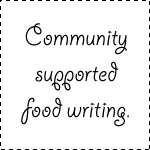
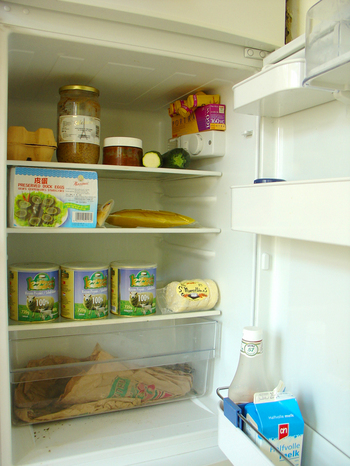

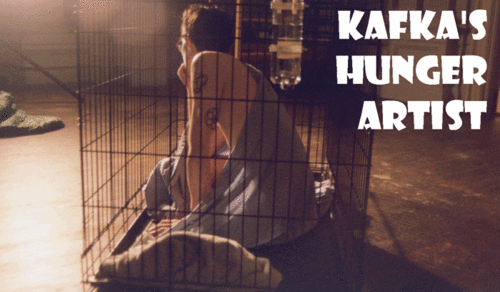
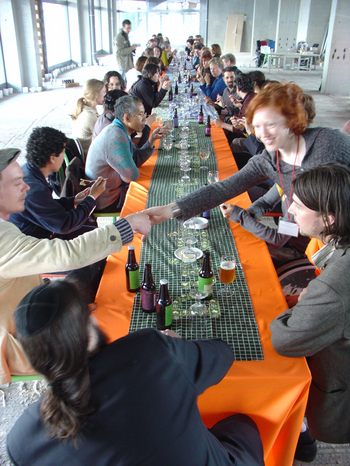
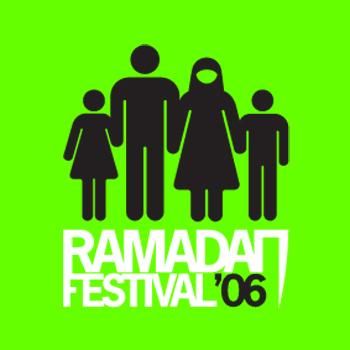
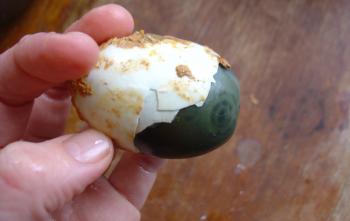
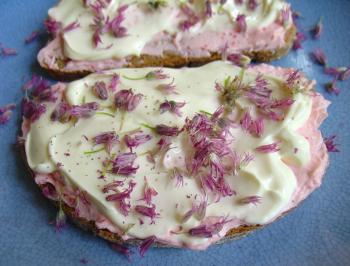







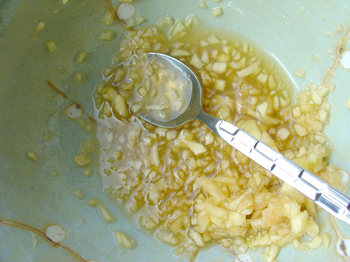
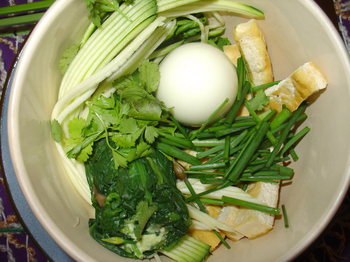
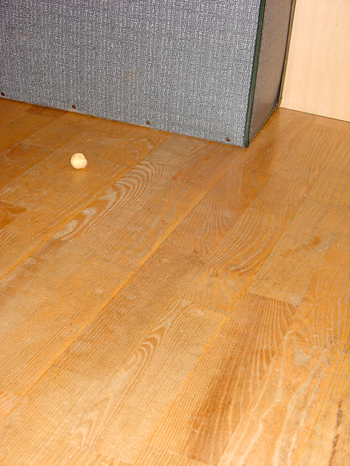



Sorry Debra, It must be my rusty English, but I don’t get the story. What do I have to fill in at the empty space and why did your friend actually get sick? Was she chocking?
Comment by Zus van Zonen — April 27, 2005 @ 21:55
Oh, maybe I wasn’t clear… Alice was faking hating the charoset because I told her that you’re not allowed to say you like it. To show her exuberant LOVE of the foodstuff she pretended to find it really terrible.
And the reason you have to fill in the blank is that I find it problematic to use the terms ‘Israelites’ and ‘Egyptians’ to refer to the players in the book of Exodus. It makes it sound like the experience of slavery is unique when in fact it is all around us.
To fill in the blank you need the word Egyptian.
Comment by debra — April 27, 2005 @ 22:29
Heleen, I guess to understand the context of this story you would need to know a few things:
Passover is Pesach is the story from the book of Exodus (get it) of the ‘Israelites’ fleeing an oppressive situation in Egypt. In Egypt they are slaves, building pyramids with mortar and bricks. With Moses as their leader and God on their side (so the story goes) they are able to flee from Egypt. They wander around the desert for 40 years (although the distances involved don’t warrant this dillydallying) because they have to psychologically prepare themselves for being a liberated people. Apprently it takes 40 years to do this.
Comment by debra — April 28, 2005 @ 8:49
Oh, nog een ding, in het stuk hierboven,
dat ‘Zij’ - dat ben ik. Er is hele onderdeel van de Pesach seider waarin 4 kinderen stellen vragen waarom we Pesach vieren. De slechterik vraagt waarom hebben ZIJ dit gedaan (weg gaan uit Egypte, 40 jaar wandelen alvorens de tien geboden te mogen ontvangen enzv). Waarop wordt beantwoordt dat ZIJ en niet JIJ hebben een pakt met God.
Ik vind het moeilijk uit te leggen omdat ik niet in God geloof en probeer feesten zoals Pesach als een feest van mijn gemeenschap.
Comment by debra — April 28, 2005 @ 8:59
Reading it again after your explanation, it makes perfect sense.
But if you’re supposed to hate something, why present it to ‘dear friends’ and be surprised they don’t like it…
Comment by Heleen — April 28, 2005 @ 9:15
Jews remind remind themselves (zij dat ben ik) in this period of the year about the oppression that took place back then (and more recently). To do this we eat foods that are delicious so that we want to eat them again, and build them into traditions that we like to perform so that we do them again and again. In this tradition, we’re just not allowed to SAY that we like the FLAVOUR of the food, because that would be like saying that we LIKE SLAVERY.
The food is a symbol. So you eat the symbol and think about the meaning behind it. Christians have symbolic food as well. Catholics don’t eat hosti because it’s delicious, but because it’s part of a ritual in which it represents the body of Jesus. If hosti were bitter how motivated would folks be to eat it? If it were candy how much more? And if it were candy and folks loved it so much that the relationship between the hosti-eater and the symbol got completely out of hand, you might want to change the recipe to bring it back into proportion.
I was presenting my dear friends an experience related to a festival that was going on exactly at that moment. It would have been silly for me to serve up food that I don’t eat in this period of the year (foods with yeast, bread for example). So in my lack of care with regard to preparing the MENU, I just grabbed what was at hand, - the matzah, charoset, and horseradish.
Have you ever celebrated a religious holiday in which food plays a ritual role?
Comment by debra — April 28, 2005 @ 11:13
I did a first communion when I was about 8 years old… but that’s about it, I think. I have turkey on Christmas, eggs on Easter, that’s tradional, but not ritual, isn’t is? The catholics dont’ have that much with ritual food I think…
Comment by Heleen — April 28, 2005 @ 14:29
And the thing with the hosti, the catholics got that from a jew…
Comment by Heleen — April 28, 2005 @ 14:33
Eggs during Easter are most definitely ritual. All during the forty days of Lent Catholics are to refrain from eating ‘foods of the flesh’, dairy, eggs, and of course meat. Traditionally they’re supposed to eat only one meal a day and the rest of the meals can only be ‘collation’, tiny meals, something liquid (not alcohol) and a cracker or something light. People gave eachother eggs for Easter to celebrate the end of the Lenten fast.
Not eating ‘meat’ on Friday, which later became fish, is about remembering the cruxifiction of Jesus and denying yourself (if you’re a believing Catholic) flesh. Eat fish and rise above it all.
Catholics absolutely have ritualistic food. You’ve just got to find praciticing Catholics!
Comment by debra — April 29, 2005 @ 10:00
I forgot all about the friday - fishday…
When I was a young child I thought the fish on friday was because of the fact that there was a big market in town that day, with a lot of fish selling stands…
Comment by Heleen — April 29, 2005 @ 20:16